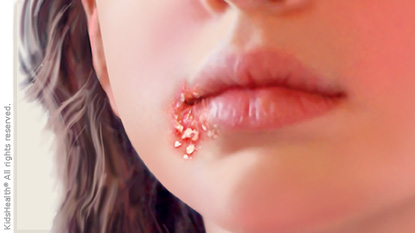- Parents Home
- Para Padres
- A to Z Dictionary
- Allergy Center
- Asthma
- Cancer
- Diabetes
- Diseases & Conditions
- Doctors & Hospitals
- Emotions & Behavior
- First Aid & Safety
- Flu (Influenza)
- Food Allergies
- General Health
- Growth & Development
- Heart Health & Conditions
- Homework Help Center
- Infections
- Newborn Care
- Nutrition & Fitness
- Play & Learn
- Pregnancy Center
- Preventing Premature Birth
- Q&A
- School & Family Life
- Sports Medicine
- Teens Home
- Para Adolescentes
- Asthma
- Be Your Best Self
- Body & Skin Care
- Cancer
- Diabetes
- Diseases & Conditions
- Drugs & Alcohol
- Flu (Influenza)
- Homework Help
- Infections
- Managing Your Weight
- Medical Care 101
- Mental Health
- Nutrition & Fitness
- Q&A
- Safety & First Aid
- School, Jobs, & Friends
- Sexual Health
- Sports Medicine
- Stress & Coping
Impetigo
What Is Impetigo?
Impetigo (pronounced: im-peh-TY-go) is a very common bacterial skin infection, especially in young kids. But anyone can get it. It can cause blisters or sores on the face, hands, and legs.
What Causes Impetigo?
Two types of bacteria — Staphylococcus aureus and group A streptococcus (which also causes strep throat) — usually cause impetigo. Methicillin-resistant Staphylococcus aureus (MRSA) is also becoming an important cause of impetigo.
Someone can be more likely to develop impetigo when their skin is already irritated by another problem, such as eczema, poison ivy, insect bites, and cuts or scrapes. Bacteria that usually live harmlessly on the skin can get into the body through the area of broken skin, leading to symptoms of impetigo. Scratching a sore or a rash is a common cause — for example, poison ivy can get infected and turn into impetigo. It also happens more often in warm, humid environments.
Washing your hands and face well and often can help prevent it.
What Are the Signs & Symptoms of Impetigo?
Impetigo may affect skin anywhere on the body, but is most common around the nose and mouth, hands, and forearms.
The three types of impetigo are non-bullous (crusted), bullous (large blisters), and ecthyma (ulcers):
- Non-bullous or crusted impetigo is most common. It begins as tiny blisters that eventually burst and leave small wet patches of red skin that may weep fluid. Gradually, a yellowish-brown or tan crust covers the area, making it look like it has been coated with honey or brown sugar.
- Bullous impetigo causes larger fluid-containing blisters that look clear, then cloudy. These blisters are more likely to stay longer on the skin without bursting.
- Ecthyma (pronounced: ek-THY-muh) impetigo looks like "punched out" ulcers with yellow crust and red edges.

Is Impetigo Contagious?
Impetigo is contagious, and can spread to anyone who touches infected skin or items that have touched infected skin (such as clothing, towels, and bed linens). It can be itchy, so people also can spread the infection when they scratch it and then touch other parts of their body.
How Is Impetigo Diagnosed?
In most cases, doctors can diagnose impetigo based on how the rash looks. Occasionally, they may need to take a sample of fluid from blisters for testing.
How Is Impetigo Treated?
Impetigo is typically treated with antibiotics, either as an ointment/cream put on the skin or a medicine taken by mouth:
- When it just affects a small area of the skin (and especially if it's the non-bullous form), impetigo is treated with antibiotic ointment for 5 days.
- If the infection has spread to other areas of the body or the ointment isn't working, the doctor may prescribe an antibiotic pill or liquid to be taken for 7–10 days.
After antibiotic treatment begins, healing should start within a few days. It's important to make sure that you take the medicine as prescribed. Otherwise, a deeper and more serious skin infection could develop.
While the infection is healing, gently wash your skin with clean gauze and antiseptic soap every day. Soak any areas of crusted skin with warm soapy water to help remove the layers of crust (you don't have to remove all of it).
To keep impetigo from spreading to other parts of the body, the doctor or nurse will probably recommend covering open infected areas with gauze and tape or a loose plastic bandage. Keep your fingernails short and clean to prevent scratching that could lead to a worse infection.
Students with impetigo usually can return to school 24 hours after starting treatment.
Can Impetigo Be Prevented?
Keeping skin clean can help prevent impetigo. Wash your hands well and often and take baths or showers regularly. Pay special attention to skin injuries (cuts, scrapes, bug bites, etc.), areas of eczema, and rashes such as poison ivy. Keep these areas clean and covered.
To prevent impetigo from spreading among family members, everyone should use their own clothing, sheets, razors, soaps, and towels. When these items get dirty, wash them separately in very hot water. Using paper towels instead of cloth towels also can help keep the infection from spreading to others. Sharing makeup is never a good idea but even more risky if you have impetigo.
When Should I Call the Doctor?
Call the doctor if you have signs of impetigo, especially if you've been around a family member, friend, or classmate with the infection.
Keep an eye on the sores and call the doctor if the skin doesn't begin to heal after 3 days of treatment or you develop a fever. If the area around the rash becomes red, warm, or tender to the touch, call your doctor right away.

© 1995- The Nemours Foundation. KidsHealth® is a registered trademark of The Nemours Foundation. All rights reserved.
Images sourced by The Nemours Foundation and Getty Images.
